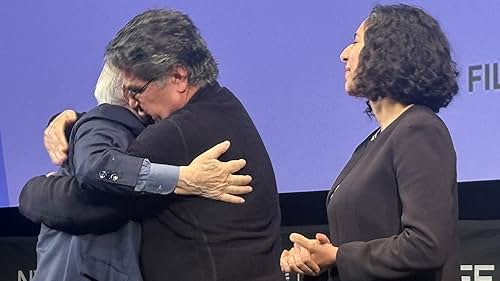Jafar Panahi Honors Martin Scorsese as “The Current God of Cinema” at New York Film Festival
New York City, October 24, 2025 — In a moment that has sent ripples through the global film community, renowned Iranian filmmaker Jafar Panahi publicly lauded American auteur Martin Scorsese, calling him “The Current God of Cinema” during a heartfelt appearance at the prestigious New York Film Festival.
The event, held at the Lincoln Center’s Alice Tully Hall, was marked not only by Panahi’s reverence for Scorsese’s cinematic legacy but also by a gesture of profound respect as he bowed deeply before the legendary director.
A Moment of Reverence in the Heart of New York

The New York Film Festival, one of the most celebrated showcases of international cinema, has long been a platform where filmmakers, critics, and cinephiles converge to honor the art of filmmaking.
This year’s festival was no exception, with a lineup featuring both contemporary masterpieces and timeless classics.
However, the highlight of the festival’s opening night was undoubtedly the moment when Jafar Panahi, known for his courageous and poetic films that challenge censorship and explore social realities in Iran, took to the stage to pay tribute to Martin Scorsese.
Panahi, whose works such as Taxi Tehran and The White Balloon have garnered critical acclaim worldwide, expressed his admiration for Scorsese’s unparalleled contributions to cinema.
In a speech that resonated deeply with the audience, Panahi stated, “Martin Scorsese is not just a filmmaker; he is the current god of cinema.
His storytelling, his passion for the art, and his relentless pursuit of truth through film have inspired generations of filmmakers, including myself.”
The Significance of the Title “The Current God of Cinema”
Referring to Scorsese as “The Current God of Cinema” is a powerful testament to the director’s enduring influence and stature in the film industry.
It echoes the reverence historically reserved for legendary figures like Orson Welles, Alfred Hitchcock, and Akira Kurosawa, positioning Scorsese as a contemporary titan whose work continues to shape the language of cinema.
In the context of Panahi’s statement, the phrase underscores the ongoing evolution of cinematic greatness.
It highlights how modern filmmakers view Scorsese not merely as a master storyteller but as a guiding force—a divine figure whose artistic vision elevates the medium to an art form that transcends cultural and political boundaries.
The Bow as a Gesture of Respect

Perhaps the most striking moment of the evening was Panahi’s act of bowing deeply before Scorsese.
This gesture, often seen in Asian cultures as a sign of profound respect, humility, and gratitude, was interpreted by many as a symbolic acknowledgment of Scorsese’s influence and legacy.
The act resonated with the audience, many of whom saw it as a bridging of cultural divides—a universal gesture of admiration from one artist to another.
Scorsese, known for his humility and reverence for cinema’s history, responded with a warm smile and a nod, acknowledging Panahi’s gesture.
The interaction between the two filmmakers was a poignant reminder of the shared passion that unites artists across continents and generations.
A Reflection on Cinema’s Power and Resilience
This exchange between Panahi and Scorsese also serves as a broader reflection on the resilience and power of cinema as an art form.
Both directors have faced significant challenges—Panahi with censorship and political repression in Iran, and Scorsese navigating the changing landscape of Hollywood and global cinema.
Their mutual respect underscores the idea that cinema remains a vital, transformative force capable of inspiring, challenging, and uniting audiences worldwide.
Reactions from the Film Community

The event has sparked widespread discussion within the film community and beyond.
Critics have praised Panahi’s words as a testament to the enduring influence of Scorsese’s work, which includes iconic films such as Taxi Driver, Goodfellas, The Irishman, and Raging Bull.
Many see this moment as a reaffirmation of cinema’s role as a universal language that continues to evolve through the contributions of visionary filmmakers.
Prominent filmmakers and critics took to social media to express their admiration.
“This is a beautiful moment that encapsulates the spirit of cinema—respect, inspiration, and a shared passion for storytelling,” tweeted film critic Lisa Johnson.
“Panahi’s humility and reverence for Scorsese remind us why we fell in love with movies in the first place.”
The Legacy Continues
As the festival progresses, the focus on the enduring legacies of filmmakers like Scorsese and Panahi is expected to deepen.
Both directors exemplify the resilience of cinema—Scorsese through his relentless pursuit of truth and artistic excellence, and Panahi through his unwavering commitment to storytelling despite oppressive circumstances.
This event at the New York Film Festival not only celebrates their individual achievements but also highlights the interconnectedness of global cinema.
It reminds us that, regardless of borders or political landscapes, the language of film remains a unifying force—one that continues to inspire new generations of artists.
Conclusion
The moment when Jafar Panahi called Martin Scorsese “The Current God of Cinema” and bowed to him at the New York Film Festival will be remembered as a defining tribute in contemporary film history.
It was a testament to the profound respect that exists among filmmakers and a celebration of cinema’s enduring power to inspire and transcend boundaries.
As the festival continues, the film community looks forward to more such moments—reminders that, in the world of cinema, greatness is a shared journey, and respect among artists is the true measure of its timeless spirit.
News
The Unyielding Power of Suni Mentality: How It Continually Fuels OG Anunoby’s Success on the Court
The Unyielding Power of Suni Mentality: How It Continually Fuels OG Anunoby’s Success on the Court In the high-stakes world…
Her on-air voice cracked. The tears were real. The betrayal behind them will leave you speechless. What really happened to Dylan Dreyer?
A Moment of Silence and Emotional Revelation Shakes the Today Show Studio as Dylan Dreyer’s Voice Breaks, Unveiling Unexpected Personal…
Pat Sajak’s Daughter Drops a Bomb on Ryan Seacrest! The “Wheel of Fortune” mic might be slipping. You won’t BELIEVE what she said.
Shocking Revelations Shake the World of Game Shows: Pat Sajak’s Daughter Questions Ryan Seacrest’s Suitability to Host Wheel of Fortune In…
Azzi Fudd’s Unwavering Confidence in UConn Huskies Women’s Basketball Team: A Clear Message of Leadership and Trust
Azzi Fudd’s Unwavering Confidence in UConn Huskies Women’s Basketball Team: A Clear Message of Leadership and Trust In the world…
Sophie Cunningham’s Seventh Season: A Breakthrough Year for the Shooting Star
Sophie Cunningham’s Seventh Season: A Breakthrough Year for the Shooting Star In the landscape of professional basketball, few stories are…
Brook Lopez Shines with 15 Points in 17 Minutes, While John Collins Impresses in Debut with 14 Points and 7 Rebounds
Brook Lopez Shines with 15 Points in 17 Minutes, While John Collins Impresses in Debut with 14 Points and 7…
End of content
No more pages to load












